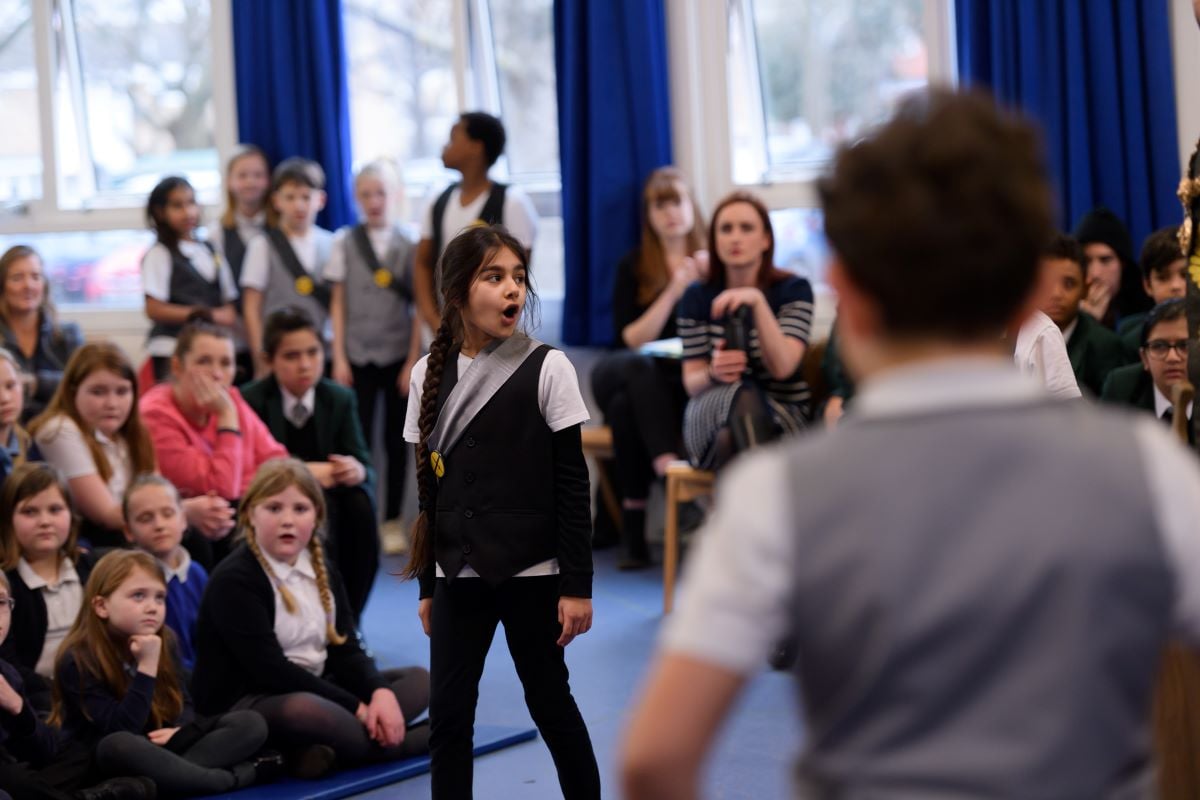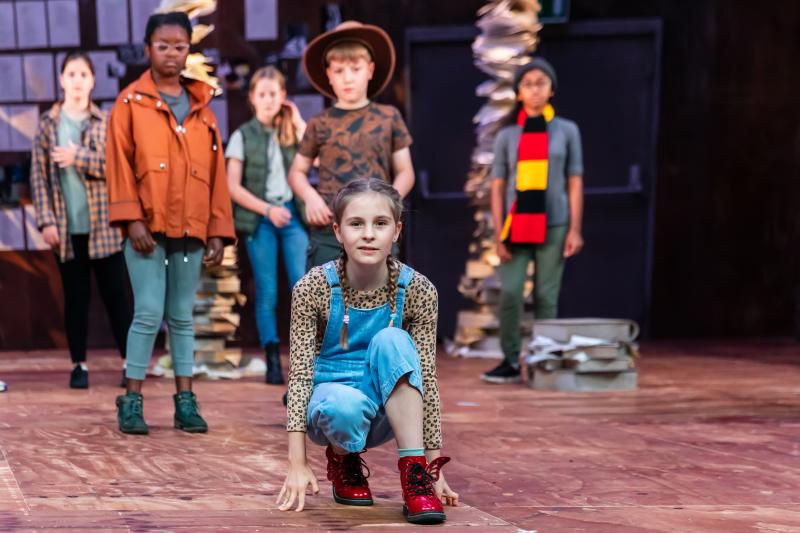
First Encounters with Shakespeare: Romeo and Juliet at Sydenham Primary School, Leamington Spa, 2024
Photo: Joe Bailey ©RSC
Measuring the impact of Shakespeare
The RSC is currently the only theatre company to hold Independent Research Organisation status. It is using that to initiate research about things that matter to the whole sector, as Jacqui O’Hanlon shares.
What if there was a way of measuring the impact of an arts-rich education on children and young people? What if we developed tools to understand what happens when they engage in expressive arts subjects and experiences? This is the story of our attempt at doing that.
At the RSC, we’ve long been interested in research – from teacher action research to longitudinal studies into the benefits of expressive arts to young people in schools. It can be frustrating to research things that should be readily understood, but we haven’t yet landed the argument on the value of expressive arts subjects – either in policy making or in wider society.
One of the sticking points is how to measure impact – and even if it’s possible to. It seems we only value things we can measure. And because arts subjects and experiences are so enmeshed in the human psyche, they seem too complex and multi-faceted to be measurable.
But with the collaboration of teachers, we co-constructed a research project to test which measurement tools might help us better understand the impact of our work bringing theatre-based approaches to teaching Shakespeare into the classroom. The result of that research is Time to Act.
Background to the research
The RSC works in long-term partnerships with 280 state schools across England, alongside 15 regional theatres, with a focus on areas of structural disadvantage. Over 15 years, two themes have emerged about the difference Shakespeare’s language and theatre-based teaching approaches make to learning outcomes.
First, literacy improves: children write more, they use more complex language and they want to write. And second, academic self-confidence improves: when a child feels confident about Shakespeare, they feel differently about what they can achieve.
We rely on highly skilled teachers in our work – none of the impacts are possible without them. But we didn’t have a way of measuring what they were reporting nor a specific enough understanding about what was changing in children’s writing, or in their sense of self.
Research Fellows, Lynsey McCulloch and Matthew Colins, developed two research approaches: a randomised control trial (RCT) involving schools that had never previously worked with the RSC, and a teacher-led action research programme by those who had been using RSC approaches for several years.
 Playmaking Festival, Stratford-upon-Avon, 2023. Photo: Sara Beaumont ©RSC
Playmaking Festival, Stratford-upon-Avon, 2023. Photo: Sara Beaumont ©RSC
Randomised control trial (RCT)
45 state primary schools across England – all with above average eligibility for free school meals – were recruited and randomly assigned to either an intervention or control group.
Teachers in intervention schools took part in five days of professional development with the RSC and delivered 20 hours of Shakespeare teaching to Year 5 pupils using RSC approaches.
Control schools delivered their existing curriculum. Researchers then analysed more than 3,000 written responses from children in control and intervention schools over the 12-month research period.
Findings from RCT
We measured language development in children’s writing, comparing the intervention and control schools. Both groups were responding to a character dilemma from a Shakespeare play. Overall, we found children in the intervention group, whose teachers had worked with the RSC, outperformed control schools in 98% of indicators.
The writing produced by children in the schools using theatre-based teaching approaches was longer, more detailed and more complex. The children employed richer, broader and more sophisticated vocabulary, showed a better grasp of linguistic structures and devices and were better at writing in character and expressing emotion.
Arts subjects and experiences are so enmeshed in the human psyche, they seem too complex and multi-faceted to be measurable.
Qualitative analysis of the writing also showed these children in intervention schools produced more expansive descriptions of setting, place and atmosphere, showed greater optimism and resilience when imagining character outcomes and demonstrated better inferencing skills, imagining what might come next.
While these findings are not yet generalisable to pupils’ wider writing practice, they are strongly indicative of increased sophistication in language use.
Increase in confidence
We also analysed the same young people’s belief in themselves as learners, using the Myself As a Learner Scale (MALS) – a validated measure of academic self-concept.
The MALS survey results showed that, in comparison to control school pupils, children in the intervention schools were more confident in their ability to work out what to do next when stuck, and more confident with language, in tackling work, in their own ability as a good learner and in wider problem-solving.
Teaching-led action research
The teachers who had experience of using RSC teaching approaches were based in a range of schools and SEND (special educational needs and disability) settings. They undertook classroom-based research projects using existing measurement tools as well as piloting new, inclusive measures aimed at capturing the impact of the work on literacy, wellbeing, and social and emotional development.
Here, teachers witnessed substantial improvements in pupils’ writing – in terms of breadth, depth, complexity and emotional literacy – alongside enhanced speaking and listening skills. This included children not yet meeting age-related expectations in literacy. They also evidenced increased levels of wellbeing and engagement in pupils, including those in SEND settings, in those learning English as an additional language and those with multiple ACEs (adverse childhood experiences).
Social impact investment
Alongside the research, we talked to Nesta about the measurement tools we were using. Together, we created an outcomes framework enabling us to pilot a new approach to funding. The model is based around social impact measures and, using the framework, relies on investors committing to payments if pre-agreed impact targets are met.
This is new territory for us – and relatively new for the performing arts sector. It raises lots of questions. But with an increasingly challenging funding environment, a real terms decline in public investment and shifting priorities in philanthropic giving, we need different ways of capturing the value of our work.
It’s important the sector leads the research required to develop new ways of measuring, understanding and valuing the work we all do.
Jacqui O’Hanlon is Director of Learning and National Partnerships at the Royal Shakespeare Company.
![]() rsc.org.uk
rsc.org.uk
![]() @theRSC | @RSC_Learning | @jacquiohanlon
@theRSC | @RSC_Learning | @jacquiohanlon
With thanks to Paul Hamlyn Foundation for their support and Nesta for their expertise in social impact measurement. Huge thanks to all the schools, teachers, young people and regional theatres we work with for their contribution.
Join the Discussion
You must be logged in to post a comment.